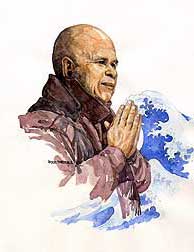By Venerable Thich Nhat Hanh (From the book Interbeing)
 1
1
Do not be idolatrous about or bound to any doctrine, theory, or ideology,
even Buddhist ones. Buddhist systems of thought are guiding means; they are
not absolute truth.
2
Do not think the knowledge you presently possess is changeless, absolute truth.
Avoid being narrow minded and bound to present views. Learn and practice nonattachment
from views in order to be open to receive others' viewpoints. Truth is found
in life and not merely in conceptual knowledge. Be ready to learn throughout
your entire life and to observe reality in yourself and in the world at all
times.
3
Do not force others, including children, by any means whatsoever, to adopt
your views, whether by authority, threat, money, propaganda, or even education.
However, through compassionate dialogue, help others renounce fanaticism and
narrow-mindedness.
4
Do not avoid suffering or close your eyes before suffering. Do not lose awareness
of the existence of suffering in the life of the world. Find ways to be with
those who are suffering, including personal contact, visits, images and sounds.
By such means, awaken yourself and others to the reality of suffering in the
world.
5
Do not accumulate wealth while millions are hungry. Do not take as the aim
of your life fame, profit, wealth, or sensual pleasure. Live simply and share
time, energy, and material resources with those who are in need.
6
Do not maintain anger or hatred. Learn to penetrate and transform them when
they are still seeds in your consciousness. As soon as they arise, turn your
attention to your breath in order to see and understand the nature of your
hatred.
7
Do not lose yourself in dispersion and in your surroundings. Practice mindful
breathing to come back to what is happening in the present moment. Be in touch
with what is wondrous, refreshing, and healing both inside and around you.
Plant seeds of joy, peace, and understanding in yourself in order to facilitate
the work of transformation in the depths of your consciousness.
8
Do not utter words that can create discord and cause the community to break.
Make every effort to reconcile and resolve all conflicts, however small.
9
Do not say untruthful things for the sake of personal interest or to impress
people. Do not utter words that cause division and hatred. Do not spread news
that you do not know to be certain. Do not criticize or condemn things of
which you are not sure. Always speak truthfully and constructively. Have the
courage to speak out about situations of injustice, even when doing so may
threaten your own safety.
10
Do not use the Buddhist community for personal gain or profit, or transform
your community into a political party. A religious community, however, should
take a clear stand against oppression and injustice and should strive to change
the situation without engaging in partisan conflicts.
11
Do not live with a vocation that is harmful to humans and nature. Do not invest
in companies that deprive others of their chance to live. Select a vocation
that helps realise your ideal of compassion.
12
Do not kill. Do not let others kill. Find whatever means possible to protect
life and prevent war.
13
Possess nothing that should belong to others. Respect the property of others,
but prevent others from profiting from human suffering or the suffering of
other species on Earth.
14
Do not mistreat your body. Learn to handle it with respect. Do not look on
your body as only an instrument. Preserve vital energies (sexual, breath,
spirit) for the realisation of the Way. (For brothers and sisters who are
not monks and nuns:) Sexual expression should not take place without love
and commitment. In sexual relations, be aware of future suffering that may
be caused. To preserve the happiness of others, respect the rights and commitments
of others. Be fully aware of the responsibility of bringing new lives into
the world. Meditate on the world into which you are bringing new beings.
From the book 'Interbeing': Fourteen Guidelines for Engaged Buddhism,
revised edition: Oct. l993 by Thich Nhat Hanh, published by Parallax Press,
Berkeley, California
Venerable Thich Nhat Hanh is a Buddhist monk, poet, peace activist, and the
author of Being Peace, The Miracle of Mindfulness, and many other books. He
lives in a monastic community in south-western France called Plum Village,
where he teaches, writes, gardens, and works to help refugees world-wide.
He conducts retreats throughout the world on the art of mindful living, and
has conducted special retreats for American Vietnam War veterans, psychotherapists,
artists, environmental activists and children.
